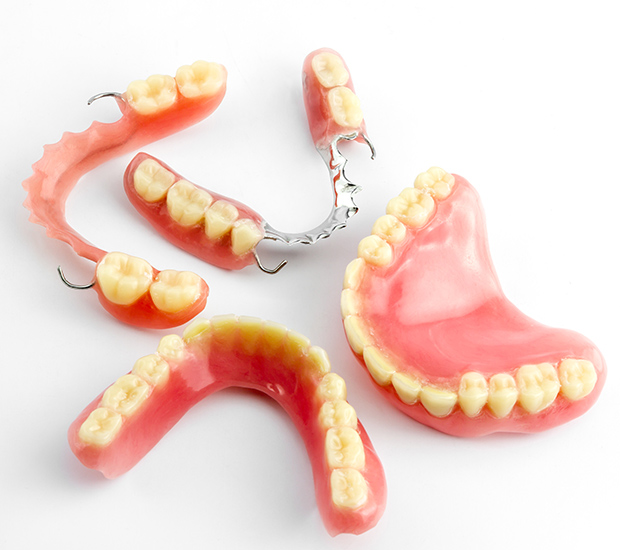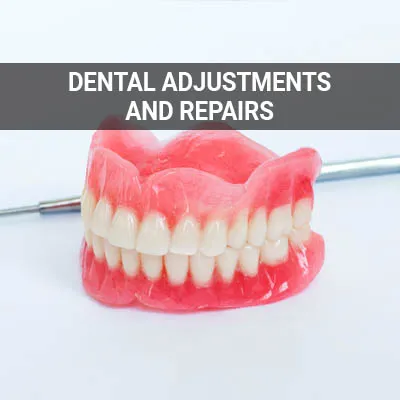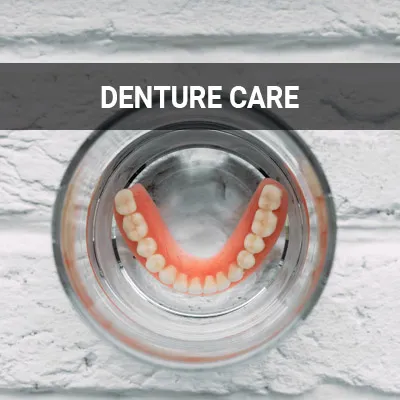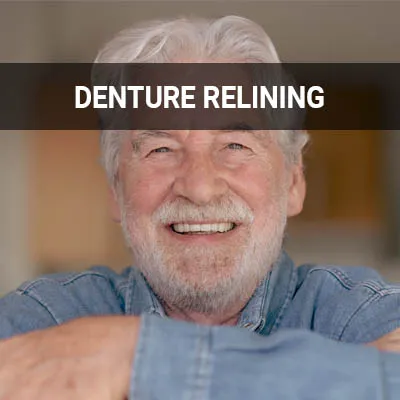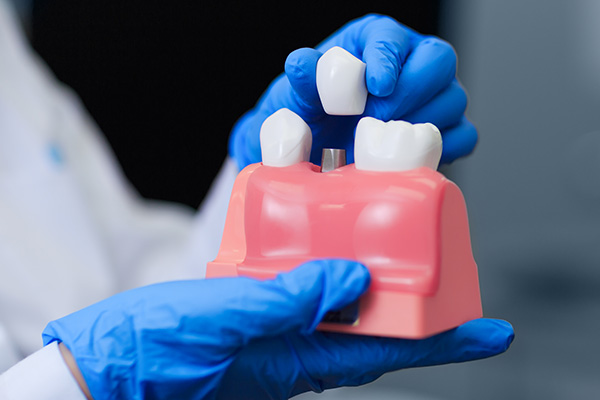What Do I Do If I Damage My Dentures Rosenberg, TX
Many patients find dentures excellent replacements for natural teeth. Over time, however, they may need to be adjusted or remade from normal wear. Dental professionals advise patients against fixing dentures themselves because they could damage the denture beyond repair.
At KRB Dentistry, we can help you with fixing dentures in Rosenberg and the surrounding area. Unfortunately, accidents happen, and dentures can get damaged. This may not only be uncomfortable but also cause injury to your mouth. We may be able to help. Call us at (832) 361-3929 to schedule an appointment today.
How Dentures Get Damaged
Though dentures will last for many years, some damage is inevitable and occurs gradually with regular wear. The mouth and jaw change over time which can cause dentures to fit poorly. It is possible for improper fit to damage dentures, as misalignment may cause undue stress to the devices when the patient bites down.
Furthermore, metal clasps, more common in dental bridges, can come loose or break off. Some dentures get damaged suddenly from an impact. The American Dental Association recommends dentures be evaluated by a professional when the prosthetic teeth are ill-fitting or damaged. We encourage patients to do the same if they misplace their dentures.
Patients may find it beneficial to use denture adhesive to help get used to dentures. Dentures should be checked for fit when they become loose and need more adhesive to stabilize. If dentures fall out, the impact could damage and crack them.
“The mouth and jaw change over time, which can cause dentures to fit poorly.”
Signs Your Dentures May Have Been Damaged
Some signs that dentures sustained damage can be obvious, such as a broken base or tooth. Other types of damage can be less immediately apparent. Whether poor condition results from wear and tear or immediate breakage, it is important to know some common signs it is time for repairs or replacement:
- Chips or cracks: Minor chips or cracks in the base or replacement teeth happen frequently. These defects in denture surfaces can cause irritation to the gums, tongue, and soft tissues of the mouth. They can also harbor bacteria, increasing the risk of developing cavities in the remaining natural teeth.
- Persistent odors: An odor that does not go away with proper cleaning and storage of the dentures may indicate that the integrity of their material is compromised. A persistent smell can mean the presence of harmful bacteria. Let your dentist know if you are noticing this issue.
- Discomfort or difficulty when chewing or speaking: New dentures may need a few adjustments before attaining an optimal fit. However, after this period, you should be able to wear them comfortably. A bad fit can develop if the dentures’ shape warps. The American Dental Association cautions that cleaning dentures with boiling or extremely hot water can cause this problem.
- Uneven surface of base or teeth: If the surface of the base or the teeth no longer feels smooth, this may be a sign that the dentures have become damaged or worn out. Like chips or cracks, a rough or pitted surface can chafe sensitive mouth tissues. It can also create a haven for bacteria and potentially lead to infections and other issues.
“Whether poor condition results from wear and tear or immediate breakage, it is important to know some common signs it is time for repairs or replacement.”
Common Causes of Denture Damage
Dropping dentures is a common issue. To reduce the risk of this type of damage, only take out and clean your dentures over a soft surface, not over the floor or sink. Dentists usually give recommendations as to which foods to avoid when wearing dentures as well.
Improper cleaning practices can damage dentures over time. An article in the Journal of Prosthetic Dentistry describes the effects of common cleaning materials on the integrity of denture materials. Materials such as bleach, alcohol-based mouthwash, and regular toothpaste can damage dentures' surfaces. Ask your dentist about the best routines and materials to preserve your dentures.
“An article in the Journal of Prosthetic Dentistry describes the effects of common cleaning materials on the integrity of denture materials.”
Check out what others are saying about our dental services on Yelp: What Do I Do If I Damage My Dentures in Rosenberg, TX
The Importance of Seeing a Dentist for Denture Repair
While do-it-yourself repair kits exist, the more reliable way to deal with damaged dentures is to see a dentist as soon as possible. It is important to have a professional evaluate the fit and repair or replace the dentures properly. Many repairs can be performed within a couple of days.
Following your dentist's recommendations is the best way to reduce the likelihood of damage and to catch it quickly when it does occur. Proper care and cleaning can minimize the risk of breakage. Checking in with your dentist every six months can help catch minor damage before it worsens.
“It is important to have a professional evaluate the fit and repair or replace the dentures properly.”
Questions Answered on This Page
Q. How do dentures get damaged?
Q. What are the signs your dentures may have been damaged?
Q. What are common causes of denture damage?
Q. What is the importance of seeing a dentist for denture repair?
People Also Ask
Q. How can I tell if my dentures need to be relined or rebased?
Q. What should I do if my dentures start to feel uncomfortable?
Q. What lifestyle changes will people experience after getting dentures?
Q. How can I care for my dentures?
Q. What can I expect before and after denture placement?
Q. What is a partial removable denture for one missing tooth?
Frequently Asked Questions
Q. Can I use glue for fixing dentures?
A. Dentists caution against using superglue to repair a break. This material is not intended for use on anything that goes in the mouth. The chemicals in it can cause toxic reactions. In addition, it can be difficult to remove and can prevent a dentist from performing proper repairs.
Q. Is it better to see a dentist about fixing dentures or get a new set?
A. This depends on the type of damage and the age of your dentures. Most dentures last between five and 10 years with proper care. If a denture is at the end of its lifespan, it can make sense to get a replacement. Likewise, a high level of damage may not be worth repairing.
Q. What are some ways to reduce the risk of damaging my dentures?
A. Proper care can help you wear your dentures comfortably for the maximum possible time period. Reduce the risk of cracks and other impact damage by only handling the dentures over a soft surface such as a towel. Following your dentist's care and cleaning instructions can help avoid cracks and abrasions.
Q. What happens if I keep wearing damaged dentures?
A. Damaged dentures tend to cause a bad fit. Continuing to wear ill-fitting dentures instead of fixing them can lead to problems such as gum pain, irritation, sores, and even infection. Poor placement can also affect the ability to chew food, resulting in digestive issues.
Q. Can all types of damage to dentures be fixed, or will I need a replacement?
A. Many types of damage can be repaired. If the damage affects a specific tooth replacement or only the base of the dentures, it may be possible to replace only the affected part. Your dentist will inspect the dentures and make an appropriate recommendation.
Q. Is there a way to completely prevent damage to dentures?
A. Even with careful maintenance, dentures do not last forever. Your dentist will give you care instructions to help you extend the life of your dentures as thoroughly as possible. Be sure to follow your dentist's advice on how to safely clean dentures, such as avoiding abrasive cleaning material and whitening toothpaste, bleach-containing products, and hot water that could warp your dentures.
Denture Terminology
Call Us Today
Damaged dentures only get worse with time. Only a dental professional can address these problems. Take care of your oral health needs. Call us at 832-361-3929 for an appointment to fix your dentures or get an adjustment for a better fit.
Helpful Related Links
- American Dental Association (ADA). Glossary of Dental Clinical Terms. 2024
- American Academy of Cosmetic Dentistry® (AACD). Home Page. 2024
- WebMD. WebMD’s Oral Care Guide. 2024
About our business and website security
- KRB Dentistry was established in 2014.
- We accept the following payment methods: American Express, Cash, Discover, MasterCard, and Visa
- We serve patients from the following counties: Fort Bend County
- We serve patients from the following cities: Rosenberg, Richmond, Cumings, Pecan Grove, and Pleak
- National Provider Identifier Database (1124126479). View NPI Registry Information
- Healthgrades. View Background Information and Reviews
- Norton Safe Web. View Details
- Trend Micro Site Safety Center. View Details
Back to top of What Do I Do If I Damage My Dentures
